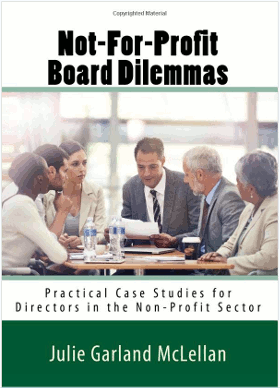|
|
|
|
|
|
|
|
|
Dear reader,
Welcome to the March 2016 edition of The Director’s Dilemma.
Our case study for March concerns a potential conflict of interests. Few things can divide or harm a board as much as conflicts of interest and yet they are common - some boards seek out people with conflicts because they will also have valuable insights; if they are wise they then handle the conflicts well, foolish boards deny the conflicts exist.
I hope you will enjoy this dilemma and the three suggested responses.
To read this email in your browser, go to www.mclellan.com.au/newsletter.html and click on 'read the latest issue'.
Bertrun recently started employment with a Regional Tribal Council as a "General Manager" to establish their for-profit Regional Economic Development Corporation. The Corporation has a board to which Bertrun reports and is developing its governance structures and practices adapting best practice recommendations to suit the culture and needs of a Regional Tribal Organisation. The Tribal Council is a government owned body and when the Economic Development Corporation is functioning independently Bertrun will transfer her employment contract to the corporation and become employed, as she always has been, in the private sector.
Bertrun has been a long time member of two non-profit boards:
-
An organization that provides community economic development services (small business loans/grants and support) to the region.
-
An organisation that provides pathways to employment through education and vocational training in rural communities.
Both boards are rather more 'hands on' than the standard policy governance model; directors play an active role as volunteers within the organisations and also as spokespeople on the issues they address.
Bertrun's knowledge and experience gained from these boards attracted the Tribal Council to offer her the role as General Manager and she remains deeply committed to the work that both boards do. But, she has a doubt: Is she creating a conflict of interest by remaining on these two external boards while being employed as the GM for the Tribal Council and later as MD for the Economic Development Corporation?
How can she manage these interests?
|
|
|
|
Sarah's Answer
It seems that the main conflict of interest in this case study is if the new Economic Development Corporation (of which Bertrun is the MD) applies to the community economic development services Board for any grants, loans or other support. She can manage this conflict by recusing herself on any Board meeting where such a loan, grant, etc. is being discussed and by ensuring she does not discuss these matters with her fellow Board members, so that the Corporation is not given any unfair advantage compared to other organisations.
It does not appear that there is any conflict of interest with the Board that provides pathways to employment; indeed there may be mutually beneficial collaborative arrangements between the new Corporation and this organisation to help place the volunteers or train young people which would be a win-win without conflicts, provided that she manage the risk of taking on too many people or the wrong people for the profit maximising objective of a private entity.
Sarah Fairhurst is a Partner at Lantau Group, a consulting firm based in Hong Kong
|
|
|
|
Julie’s Answer
Bertrun is right to be concerned about the potential for conflicts of interest. These will be particularly important during her time as a government sector employee. The public sector values due process and probity; having a staff member who is active on a board which governs (and volunteers for) an organisation with similar interests could be contentious.
Hopefully Bertrun's contract of employment specifies that she has, and may maintain, her board seats. If not, she should ensure get this confirmed in writing as soon as possible. She should also ensure the chairman of each board is happy with her new job. Then she should declare and manage the conflicts:
-
The first step is to complete a standing (or ordinary) statement of interests and include her boards/job on it. She should detail the activities.
-
Next Bertrun should talk with her boss and her two chairmen and agree, in advance, how any conflicted (or shared) interest will be managed.
-
If her boards don't have formal CoI systems Bertrun can help to instigate sound processes and policies. The board can approve a policy at the next meeting.
-
At each subsequent board meeting directors should mention any other relevant interests (an interim or ad hoc declaration) and request that the board confirm they are happy for conflicted directors to attend the meeting. Conflict of interest is usually the first item on the agenda after declaring the meeting open.
-
Where a particular item on the agenda gives rise to a potential conflict Bertrun can raise this either before the meeting, with the Chairman or Company Secretary, or at the meeting and recuse herself if required.
With all directors and relevant staff aware of potential CoI, and with sound processes, Bertrun should be well able to manage this issue successfully. Many boards struggle with CoI issues because they consider narrow, often personal or financial, interests; overlapping duties and loyalties may prove a better way to conceptualise the issues.
Julie Garland McLellan is a practising non-executive director and board consultant based in Sydney, Australia.
|
|
|
|
David’s Answer
Bertrun's employer knew of her other interests and hired her because of the expertise that these have generated. They will expect Bertrun to manage the interests. This will require mature judgement.
Bertrun should be very careful when her personal interests are related to decisions she has to make either as a director or as an employee. Where there is a conflict she should put the needs of her full time role first. Partly that is a matter of economic self-interest. It is also the role that she is most strongly identified with and the one that others will expect her to give priority. She has a duty to the Crown as a public sector employee which should take precedence over duties to non-government organisations.
If Bertrun cannot put the requirements of her job as the over-riding priority she should consider standing down from her not-for-profit roles.
David McLellan is Managing Director, APAC for WMC Global. He is based in Sydney, Australia.
|
|
|
|
What's new
|
Book review - Not for Profit Board Dilemmas; practical case studies for directors in the non profit sector.
This is the book that those of us who serve or have served on NFP Boards have been looking for!
It's easy to read, makes what could be a dull and boring topic alive and interesting and will help directors who want to be competent supporters of their cause but not necessarily experts in governance.
Winston Marsh, National President, National Speakers Association of Australia
Available at Amazon.com
If you wish to purchase multiple copies please email Julie and she will arrange a bulk discount for you. Purchase during the month of March and receive a free copy of Julie's best practise board templates and administration guide.
|
 
|
Inspirational quote for March - This month my favourite quote is:
"A problem well stated is a problem half solved."
~ Charles Franklin Kettering (1876-1958) ~
Clarity and precision are essential to the communications between board members and between the board and the organisation.
|

|
February has been another great month. I was thrilled to meet another group of inspiring public sector leaders at the 'Evaluating Governance Effectiveness in the Public Sector' course in Canberra (with you involved governance should be highly effective!) and to assist with some board inductions for Victorian Water Businesses (always such a happy and important task - a good induction is the first step towards a good board experience).
Perhaps the most joyful occasion last month was the opportunity to celebrate a 50 year work anniversary with Ron Heinrich of TressCox Lawyers; 50 years at one firm and energy left to be president of the local tennis club - you are an inspiration Ron!
As this newsletter goes to Press I am in Kuala Lumpur, meeting another group of international governance professionals for a two day 'Board Secretariat' course.
I hope to hear from you should you have a need for my services in board facilitation, performance review, recruitment or education. Or, of course, if you have a dilemma to share!
|
A few readers have asked me where I find the names for the protagonists in each case study. I can only say that I 'steal' them from people I meet or things that I read. Bertrun is a name with an ancient German root. It means "shining secret". I felt it was a good name for this month's protagonist as she will need to make sure that her commitments to her NFP boards "shine" so brightly that everyone in the boardroom is unable to forget them. She will also need to make sure they are appropriately disclosed and transparently managed alongside her new work commitments.
This newsletter - If you have any ideas for improving the newsletter please let me know. If you are reading a forwarded copy please visit my website and sign up for your own subscription.
Suggestions for dilemmas - Thank you to all the readers who have suggested dilemmas. I will answer them all eventually.
Farewell until the next issue (due 1 April 2016). I look forward to greeting you again then. In the interim I hope you will enjoy health, happiness and hard work.
Enjoy governing your corporations; we are privileged to do what we do!
Best regards,
Julie
|
|
|
|
Disclaimer
The opinions expressed above are general in nature and are designed to help you to develop your judgement as a director. They are not a definitive legal ruling. Names and some circumstances in the case study have been changed to ensure anonymity. Contributors to this newsletter comment in the context of their own jurisdiction; readers should check their local laws and regulations as they may be very different.
|
|
|
|
|
|
|
|
|
|
|
|
|




